7 Key Data Management Issues Resolved by Microsoft Fabric
In today’s fast-paced digital world, managing data effectively has become a cornerstone of success for organizations. Yet, many businesses struggle with data management challenges, such as fragmented systems, data quality issues, and the inability to derive real-time insights. These obstacles hinder data-driven decision-making and compromise the accuracy of analytics.
The data revolution with Microsoft Fabric emerges as a game-changing solution, offering a unified data source that simplifies data preparation, analysis, and advanced analytics. Its seamless data fabric implementation empowers businesses to transform their operations, ensuring better insights and faster decision-making. With Microsoft Fabric, you can unlock the full potential of your data and drive meaningful transformation.
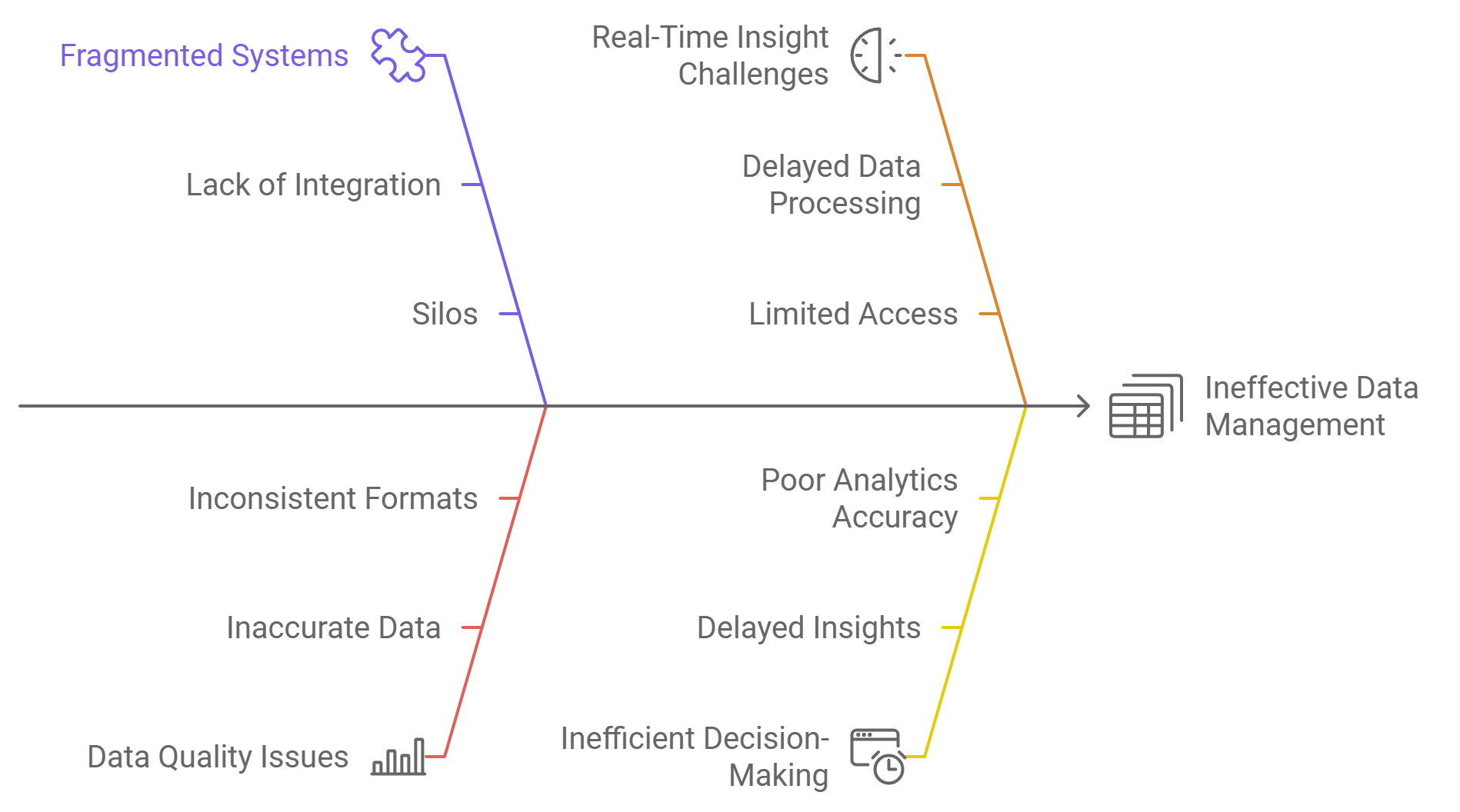
Key Takeaways
Involve end users in data processes to ensure tools meet their needs, enhancing usability and adoption rates.
Implement strong data governance with Microsoft Fabric to maintain data accuracy, security, and compliance, building trust with customers.
Adopt a structured change management approach using Microsoft Fabric to facilitate smooth transitions and minimize resistance among employees.
Develop a long-term data strategy with Microsoft Fabric to align data initiatives with organizational goals and promote sustainable growth.
Balance short-term goals with long-term vision by leveraging Microsoft Fabric's unified platform for effective data management.
Enhance data security and privacy with Microsoft Fabric's advanced features, ensuring protection against breaches and compliance with regulations.
Eliminate uncertainty around project feasibility by utilizing Microsoft Fabric's intuitive design and comprehensive analytics capabilities.
1. Lack of User Involvement in Data Processes
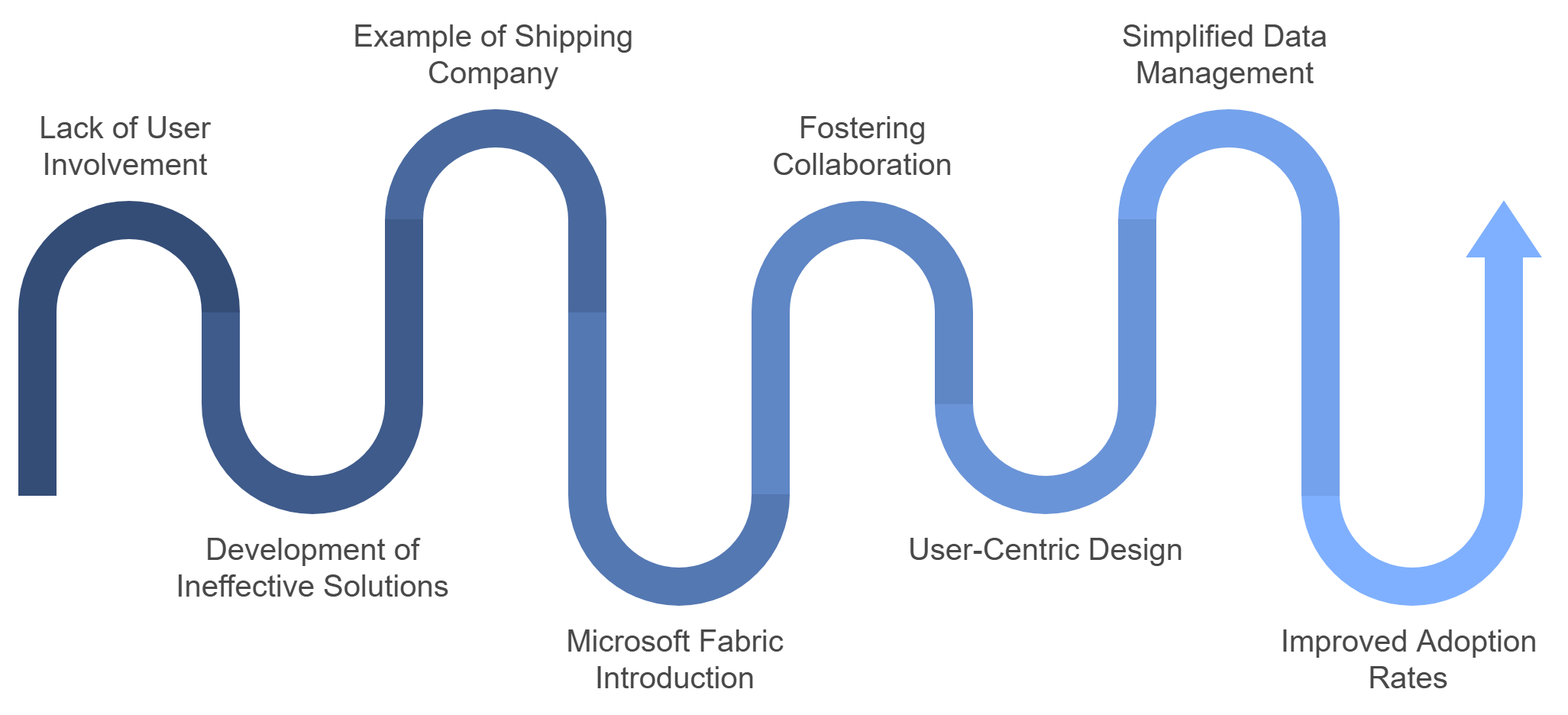
The Challenge
Many organizations face significant hurdles when users are excluded from data processes. This lack of involvement often leads to solutions that fail to meet the needs of those who rely on them daily. A striking example is a global shipping company that spent 18 months and substantial resources developing a supply chain monitoring platform. The IT department defined the requirements without consulting the end users. While the platform was delivered on time and within budget, it was barely used. Employees found their manual Excel spreadsheets more effective than the new system. This disconnect between developers and users highlights how ignoring user input can derail even the most well-funded projects.
When users are not part of the process, the resulting tools often lack usability and relevance. This creates inefficiencies, reduces adoption rates, and undermines the accuracy of data analysis. Without user involvement, organizations risk wasting resources and missing opportunities for meaningful transformation.
How Microsoft Fabric Solves It
Microsoft Fabric addresses this challenge by fostering collaboration between IT teams and end users throughout the data fabric implementation process. The platform emphasizes user-centric design, ensuring that the tools align with the actual needs of your team. By integrating intuitive interfaces and customizable features, Microsoft Fabric empowers users to engage with data processes effectively.
The platform also simplifies data management challenges by providing a unified environment. This eliminates the need for fragmented systems and enhances accessibility for all stakeholders. With Microsoft Fabric, you can involve users in every stage of the process, from data preparation to advanced analytics. This approach not only improves adoption rates but also enhances decision-making by delivering insights that are both accurate and actionable.
By prioritizing user involvement, Microsoft Fabric ensures that your organization avoids the pitfalls of poorly implemented solutions. It bridges the gap between technical teams and end users, enabling seamless collaboration and driving better outcomes. This user-focused strategy transforms how your team interacts with data, fostering a culture of innovation and efficiency.
2. Weak Data Governance
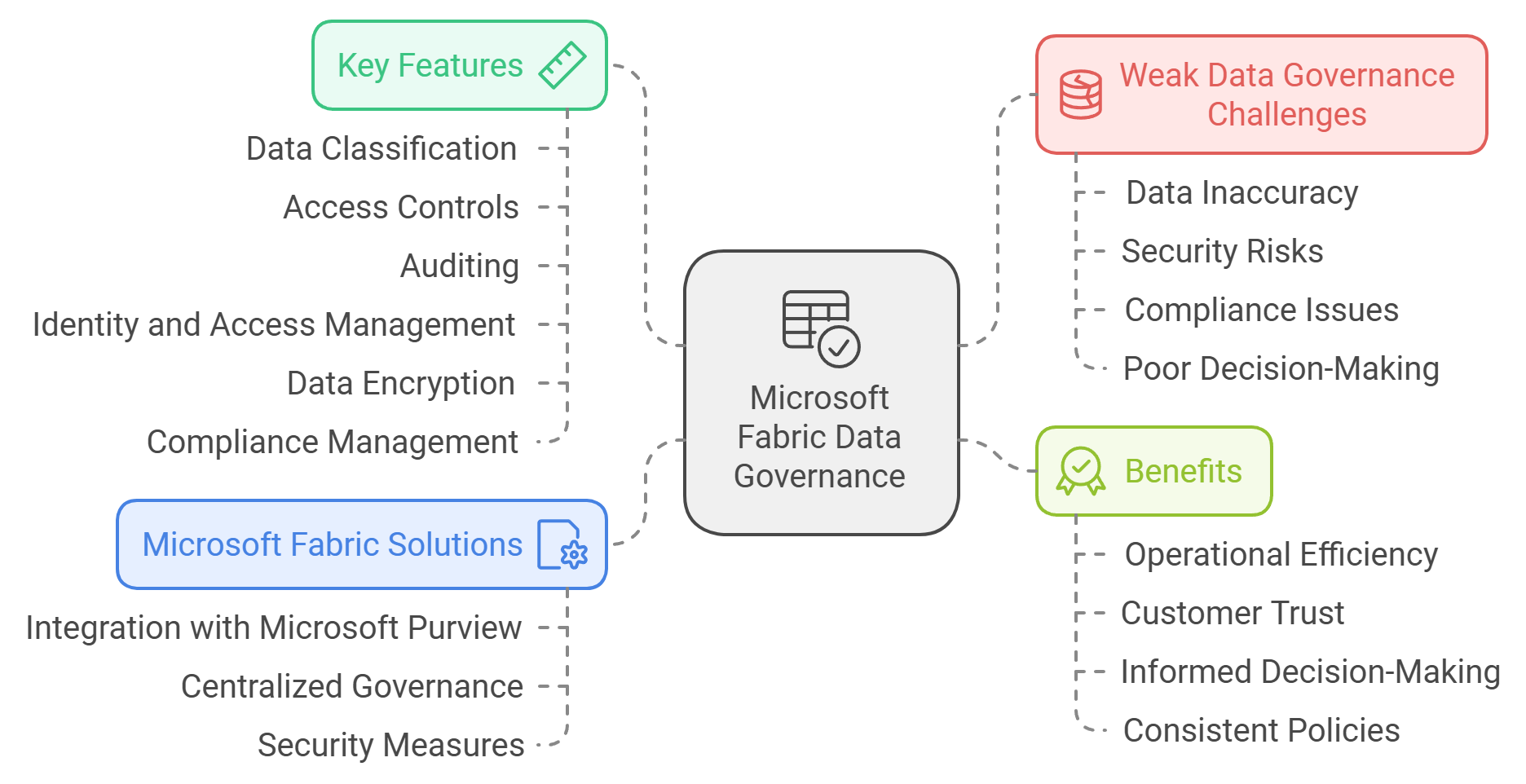
The Challenge
Weak data governance poses a significant obstacle for organizations striving to manage their data effectively. Without proper governance, businesses struggle to maintain data accuracy, security, and compliance. This lack of structure often leads to inconsistent data practices, making it difficult to ensure that sensitive information remains protected. For example, companies without clear access controls may inadvertently expose confidential data to unauthorized users, increasing the risk of breaches.
Poor governance also hampers decision-making. When data lacks integrity or is scattered across multiple systems, deriving actionable insights becomes nearly impossible. Teams waste valuable time searching for reliable data sources, which delays critical business decisions. Furthermore, weak governance creates compliance risks, as organizations fail to meet industry standards like ISO 27001 or HIPAA. These challenges not only threaten operational efficiency but also erode customer trust.
How Microsoft Fabric Solves It
Microsoft Fabric provides a robust framework to address weak data governance. Its comprehensive features empower you to manage, protect, and monitor your data with precision. By integrating with Microsoft Purview, the platform offers advanced governance capabilities, including data classification, access controls, and auditing. These tools ensure that your organization maintains compliance with industry standards while safeguarding sensitive information.
The platform’s centralized approach simplifies governance. You can control tenant settings, govern workspaces, and manage user interactions through an intuitive admin portal. This unified system eliminates the chaos of fragmented governance practices, enabling you to establish consistent policies across your organization. With Microsoft Fabric, you gain the ability to enforce data policies, monitor usage, and improve the discoverability of critical information.
Security remains a cornerstone of Microsoft Fabric’s governance solutions. The platform incorporates identity and access management, data encryption, and compliance management to protect your data at every stage. These measures not only enhance security but also build trust with customers by demonstrating your commitment to safeguarding their information.
By addressing governance challenges head-on, Microsoft Fabric transforms how you manage your data. It ensures that your organization operates with transparency, efficiency, and compliance. This structured approach empowers you to unlock valuable insights, drive informed decision-making, and achieve meaningful transformation.
3. Ineffective Change Management
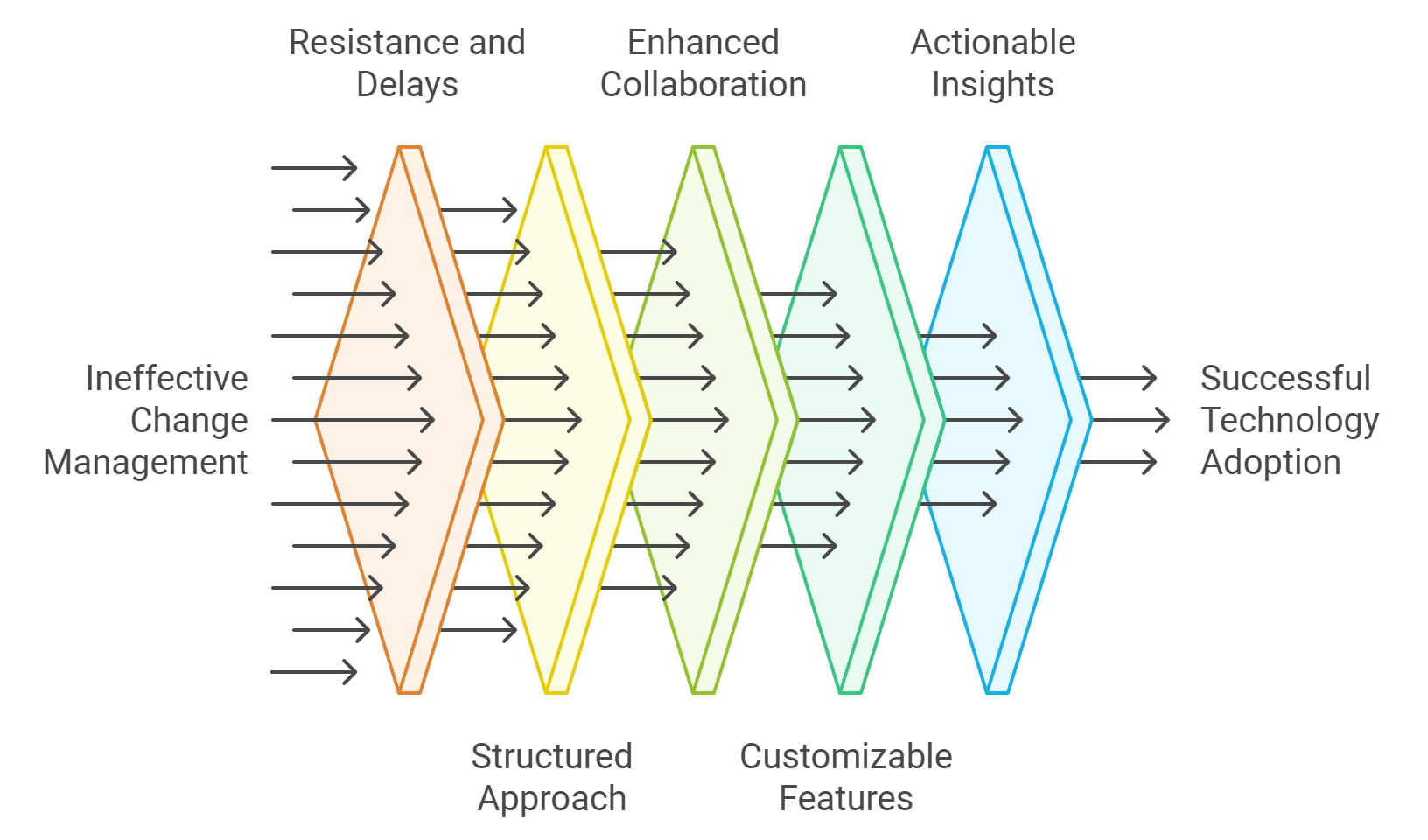
The Challenge
Change management often becomes a stumbling block for organizations trying to adapt to evolving data needs. Many teams struggle to implement new systems or processes effectively, leading to resistance from employees and delays in achieving desired outcomes. A lack of structured approaches to managing change can result in confusion, inefficiencies, and missed opportunities.
For instance, when organizations introduce new data tools without proper planning, employees may feel overwhelmed or unprepared. This resistance stems from inadequate training, unclear communication, or the absence of a clear roadmap. As a result, the adoption of new technologies slows down, and the organization fails to realize the full potential of its investment. Poor change management also disrupts workflows, making it harder to extract meaningful insights or improve decision-making.
How Microsoft Fabric Solves It
Microsoft Fabric offers a structured approach to overcoming ineffective change management. The platform simplifies the transition to new systems by providing intuitive tools and resources that empower your team. Its user-friendly design ensures that employees can quickly adapt to the platform, reducing resistance and fostering collaboration.
Chris Wagner, a leading expert in data management, describes Microsoft Fabric as a "game-changer for data management." This endorsement highlights the platform's ability to streamline transitions and address common challenges.
Microsoft Fabric enhances collaboration across teams by integrating data analytics and management tools into a unified environment. Employees can work together seamlessly, bridging the gap between technical and commercial aspects of data processes. This collaborative approach minimizes confusion and accelerates the adoption of new systems.
The platform also supports effective data fabric implementation by offering customizable features that align with your organization's unique needs. You can create tailored workflows, ensuring that every team member understands their role in the change process. By providing clear guidance and accessible tools, Microsoft Fabric eliminates the guesswork from change management.
Additionally, Microsoft Fabric equips you with actionable insights to monitor progress and identify areas for improvement. Its advanced analytics capabilities enable you to track adoption rates, measure performance, and make informed adjustments. This data-driven approach ensures that your organization stays on track and achieves its goals efficiently.
By addressing the root causes of ineffective change management, Microsoft Fabric transforms how your organization navigates transitions. It empowers your team to embrace new technologies, unlock valuable insights, and drive meaningful transformation.
4. Lack of Long-Term Data Strategy
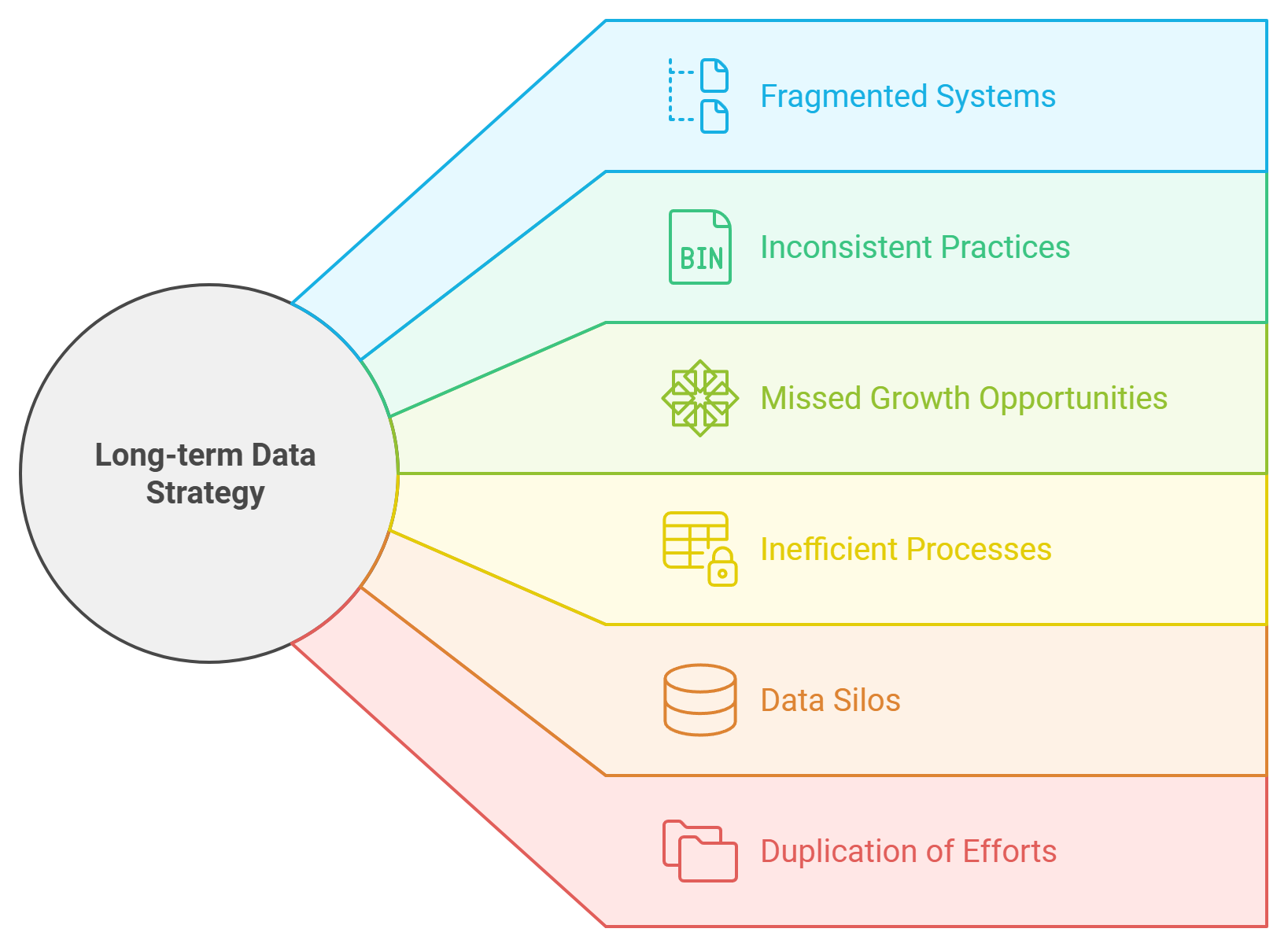
The Challenge
Many organizations struggle to establish a long-term data strategy, often focusing on short-term fixes rather than sustainable solutions. This lack of foresight creates fragmented systems, inconsistent practices, and missed opportunities for growth. Without a clear roadmap, businesses face challenges in aligning their data initiatives with broader organizational goals.
Historically, the absence of strategic planning in data management has led to significant setbacks. For example, during the 1960s and 1970s, companies failed to differentiate between reporting and operational systems. This oversight resulted in inefficient processes and hindered innovation. Similarly, businesses that lacked centralized data management systems experienced data silos, duplication of efforts, and inconsistent data quality standards. These issues highlight the importance of a cohesive, forward-thinking approach to data strategy.
When organizations fail to plan for the future, they risk falling behind competitors who leverage data effectively. The inability to adapt to evolving technologies or market demands further exacerbates these challenges. A lack of long-term strategy not only limits growth but also undermines the potential of data-driven decision-making.
How Microsoft Fabric Solves It
Microsoft Fabric provides a comprehensive framework to help you build and execute a long-term data strategy. Its unified platform eliminates the need for fragmented systems, enabling you to manage and analyze data seamlessly. By integrating advanced tools for data preparation, governance, and analytics, Microsoft Fabric ensures that your organization stays ahead of the curve.
The platform’s structured approach simplifies the implementation of sustainable data strategies. You can align your data initiatives with organizational objectives, ensuring that every effort contributes to long-term success. Microsoft Fabric also supports scalability, allowing you to adapt to changing business needs without compromising efficiency.
"Microsoft Fabric empowers organizations to unlock the full potential of their data," says Chris Wagner, a leading expert in data management. This endorsement underscores the platform’s ability to drive meaningful transformation through strategic planning.
With Microsoft Fabric, you gain access to advanced analytics capabilities that provide actionable insights. These tools enable you to monitor progress, identify trends, and make informed decisions. By leveraging these insights, you can refine your strategy and ensure continuous improvement.
Additionally, Microsoft Fabric fosters collaboration across teams, breaking down silos and promoting a culture of innovation. Its intuitive design encourages user engagement, making it easier for employees to contribute to the success of your data strategy. This collaborative environment ensures that your organization remains agile and responsive to emerging opportunities.
By addressing the root causes of ineffective planning, Microsoft Fabric transforms how you approach data management challenges. It equips you with the tools and insights needed to create a sustainable, long-term strategy. This forward-thinking approach positions your organization for success in an increasingly data-driven world.
5. Overemphasis on Short-Term Goals
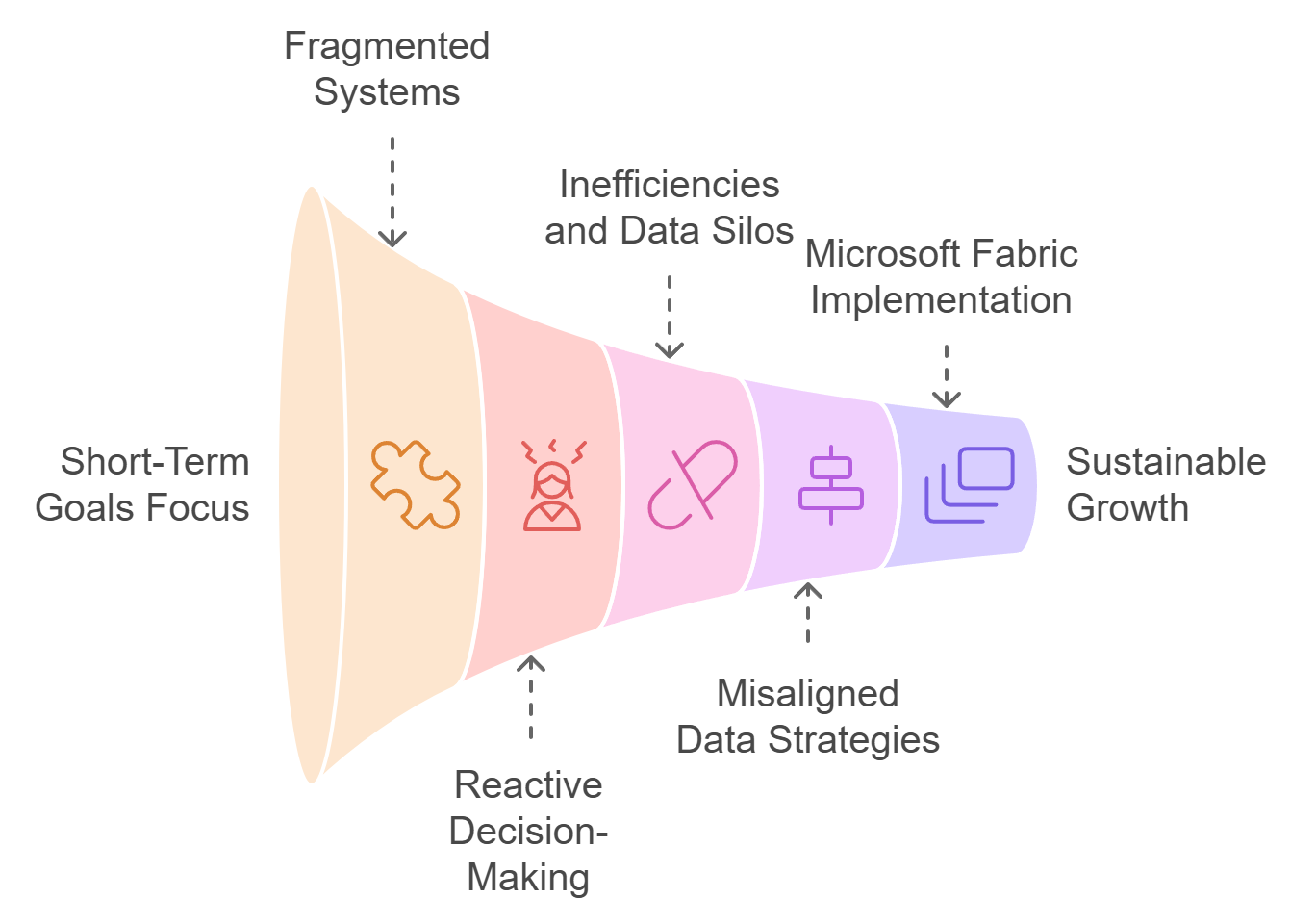
The Challenge
Focusing too heavily on short-term goals often limits an organization’s ability to achieve sustainable growth. Many businesses prioritize immediate results, such as quarterly profits or quick project completions, over long-term strategies. This approach creates fragmented systems and reactive decision-making processes. For example, teams may rush to implement temporary fixes for data issues without considering their broader impact. These quick solutions often lead to inefficiencies, data silos, and missed opportunities for innovation.
Short-term thinking also hinders the development of cohesive data strategies. Without a forward-looking perspective, organizations struggle to align their data initiatives with long-term objectives. This misalignment reduces the effectiveness of analytics and prevents businesses from fully leveraging their data assets. Over time, the lack of a strategic vision erodes competitive advantage and stifles growth.
How Microsoft Fabric Solves It
Microsoft Fabric provides a robust framework to help you balance short-term needs with long-term goals. Its unified platform eliminates the inefficiencies caused by fragmented systems, enabling you to manage and analyze data seamlessly. By integrating advanced tools for data preparation, governance, and analytics, Microsoft Fabric ensures that your organization can focus on sustainable growth.
The platform fosters collaboration across teams, breaking down data silos and promoting a culture of innovation. This collaborative environment encourages employees to think beyond immediate tasks and contribute to long-term success. With Microsoft Fabric, you can align your data initiatives with organizational objectives, ensuring that every effort supports your broader vision.
"Microsoft Fabric can help organizations achieve maximum efficiency through collaboration and breaking down data silos." This benefit highlights the platform’s ability to drive meaningful transformation by fostering teamwork and strategic planning.
Microsoft Fabric also equips you with actionable insights to monitor progress and refine your strategy. Its advanced analytics capabilities enable you to track key performance indicators, identify trends, and make informed decisions. By leveraging these insights, you can strike the right balance between short-term achievements and long-term success.
Additionally, the platform’s structured implementation process simplifies the transition to a more strategic approach. You can create tailored workflows that align with your unique needs, ensuring that every team member understands their role in achieving long-term goals. This clarity reduces confusion and accelerates the adoption of sustainable practices.
A Forrester study revealed that companies using Microsoft Fabric experienced a remarkable 379% return on investment. This statistic underscores the platform’s potential to deliver both immediate and lasting value. By adopting Microsoft Fabric, you can transform how your organization approaches data management, unlocking new opportunities for growth and innovation.
6. Data Security and Privacy Concerns
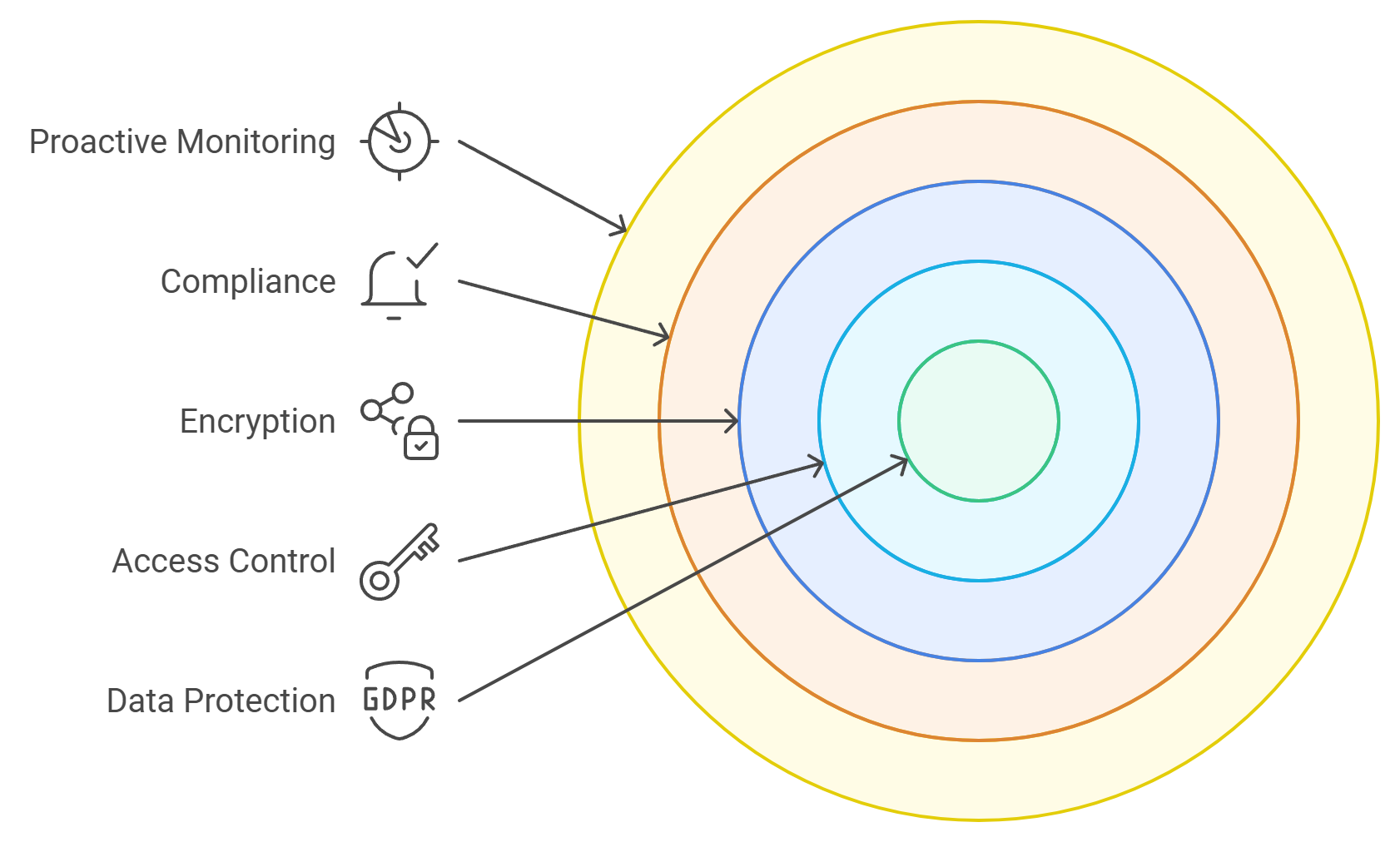
The Challenge
Data security and privacy concerns remain critical challenges for organizations managing sensitive information. Businesses face increasing risks from data breaches, unauthorized access, and compliance violations. Without robust measures, your organization may expose confidential data to malicious actors, leading to financial losses and reputational damage.
A lack of secure infrastructure often results in vulnerabilities. For example, insufficient encryption or weak authentication protocols can leave sensitive data unprotected. Additionally, balancing accessibility with security becomes a challenge. Making data too accessible increases the risk of breaches, while overly restrictive measures hinder productivity. These issues highlight the need for a comprehensive approach to safeguard your data.
Compliance with industry standards, such as GDPR or HIPAA, adds another layer of complexity. Failure to meet these requirements can result in hefty fines and legal consequences. Organizations must implement strict access controls, proactive monitoring systems, and encryption to ensure data safety. Without these measures, maintaining trust with customers and stakeholders becomes nearly impossible.
How Microsoft Fabric Solves It
Microsoft Fabric offers powerful solutions to address data security and privacy concerns. The platform incorporates advanced security features, ensuring your data remains protected at every stage. With identity and access management, you can control who accesses your data, reducing the risk of unauthorized entry. Role-based access ensures that only authorized personnel can view or modify sensitive information.
Data encryption in Microsoft Fabric provides an additional layer of protection. By encrypting data both at rest and in transit, the platform minimizes the risk of breaches. This ensures that even if unauthorized access occurs, the data remains unreadable. These measures align with best practices, helping you maintain a secure and compliant environment.
"Microsoft Fabric's security framework ensures data protection through encryption, access control, and compliance management," says a leading data expert. This highlights the platform's ability to safeguard your data effectively.
The integration of Microsoft Purview within the platform enhances governance and privacy. Purview enables centralized access control, audit logging, and data lineage tracking. These features allow you to monitor data usage, identify potential vulnerabilities, and maintain compliance with regulatory standards. Sensitivity labels and information protection tools further strengthen your data governance strategy.
Microsoft Fabric also supports proactive monitoring systems. These systems detect and prevent potential breaches, ensuring your organization stays ahead of threats. By adopting a zero-trust architecture, the platform ensures that every access request is verified, reducing the likelihood of unauthorized activity.
With Microsoft Fabric, you can achieve a balance between security and accessibility. The platform fosters collaboration without compromising data safety. Its structured implementation process simplifies the adoption of security measures, enabling your team to focus on analytics and innovation. By prioritizing data security, Microsoft Fabric empowers your organization to build trust and drive meaningful transformation.
7. Uncertainty Around Project Feasibility
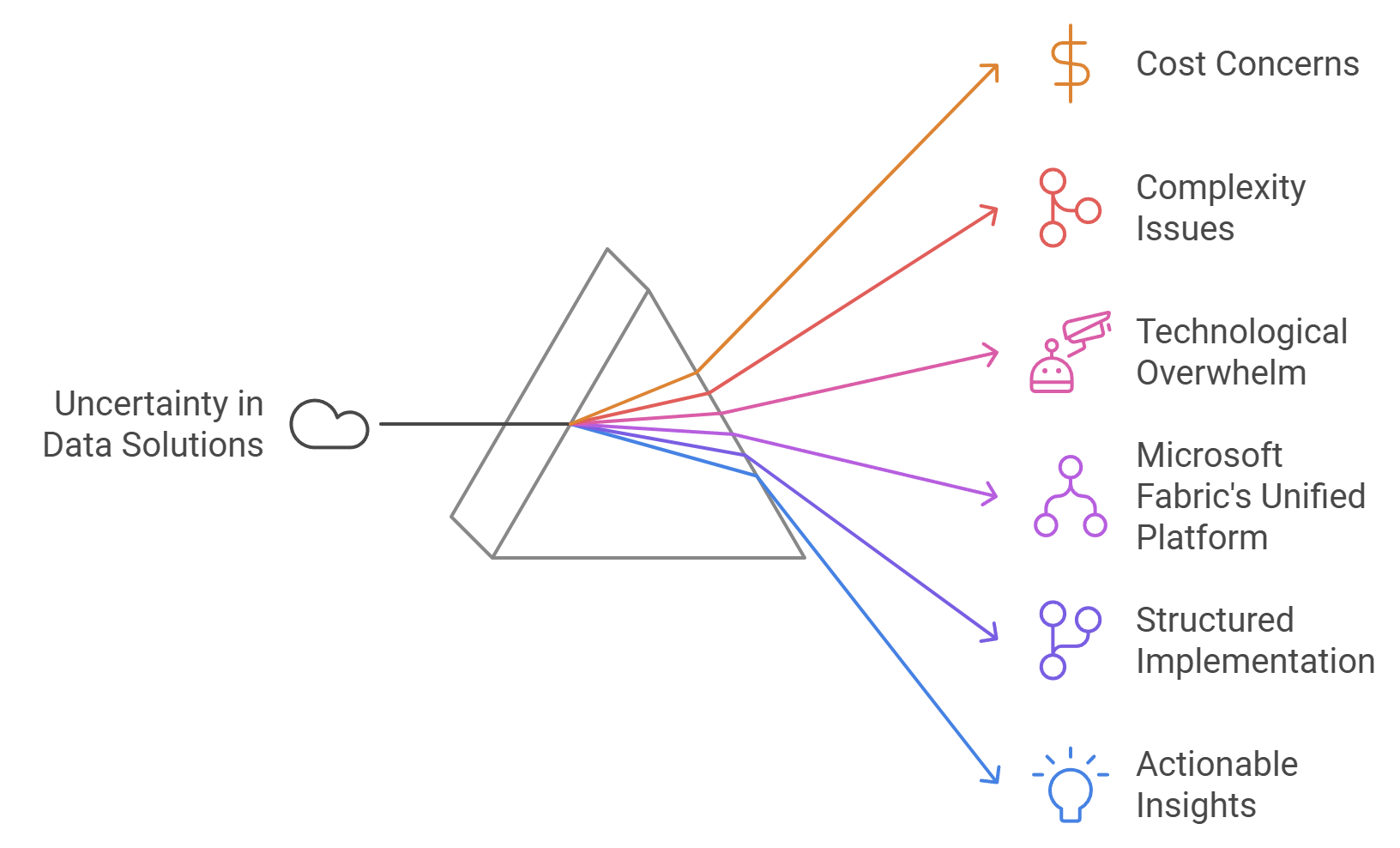
The Challenge
Uncertainty about project feasibility often prevents organizations from fully embracing new data solutions. Many businesses hesitate to invest in advanced tools due to concerns about cost, complexity, or the potential for failure. This hesitation stems from a lack of clarity regarding the return on investment and the resources required for successful implementation.
For example, organizations may struggle to estimate the time and effort needed to integrate new systems into their existing workflows. Without a clear understanding of these factors, decision-makers often delay or abandon projects altogether. This indecision limits innovation and prevents businesses from leveraging modern data technologies to their full potential.
Additionally, the rapid pace of technological advancements adds to this uncertainty. Companies may feel overwhelmed by the sheer number of options available, making it difficult to determine which solution aligns best with their goals. This confusion often leads to missed opportunities and stagnation in data-driven initiatives.
How Microsoft Fabric Solves It
Microsoft Fabric eliminates uncertainty around project feasibility by offering a unified, end-to-end platform that simplifies data management and analytics. Its intuitive design and comprehensive features make it easier for organizations to assess and implement the solution without unnecessary delays or complications.
Sakthi Kannan, a leading expert in the field, describes Microsoft Fabric as an "end-to-end, unified analytics platform that is AI-powered, open, and cost-effective." This highlights its ability to streamline the data landscape while addressing concerns about complexity and cost.
The platform’s structured implementation process ensures a smooth transition for your organization. By consolidating multiple tools into a single environment, Microsoft Fabric reduces the need for extensive training or additional resources. This simplicity allows you to focus on achieving your goals rather than worrying about technical hurdles.
Microsoft Fabric also provides actionable insights to help you evaluate the feasibility of your projects. Its advanced analytics capabilities enable you to monitor progress, measure performance, and identify potential challenges early on. These insights empower you to make informed decisions and adjust your strategy as needed, ensuring the success of your initiatives.
A Forrester study revealed that companies using Microsoft Fabric experienced a remarkable 379% return on investment. This statistic underscores the platform’s ability to deliver tangible value while minimizing risks. By adopting Microsoft Fabric, you can confidently pursue data-driven projects, knowing that the platform supports your efforts every step of the way.
With Microsoft Fabric, you gain the tools and confidence needed to overcome uncertainty and drive meaningful transformation. Its user-friendly approach and proven track record make it an ideal solution for organizations looking to unlock the full potential of their data.
The seven key data management challenges—ranging from weak governance to data security concerns—can hinder your organization’s ability to thrive in a data-driven world. By addressing these issues, Microsoft Fabric emerges as a comprehensive platform that simplifies implementation, enhances security, and fosters collaboration. Its unified approach empowers you to extract actionable insights, streamline analytics, and improve decision-making. Explore Microsoft Fabric to unlock innovative solutions tailored to your needs. Take the first step toward transforming your data processes and achieving sustainable growth.
See Also
Transforming Data Management Through Microsoft Fabric Innovations
Essential Microsoft Fabric Features For Data Experts
Three Ways Microsoft Fabric Revolutionizes Data Science
Exploring Data Innovation via Microsoft Fabric with Christopher Wagner
Creating Comprehensive Data Pipelines Using Microsoft Fabric
